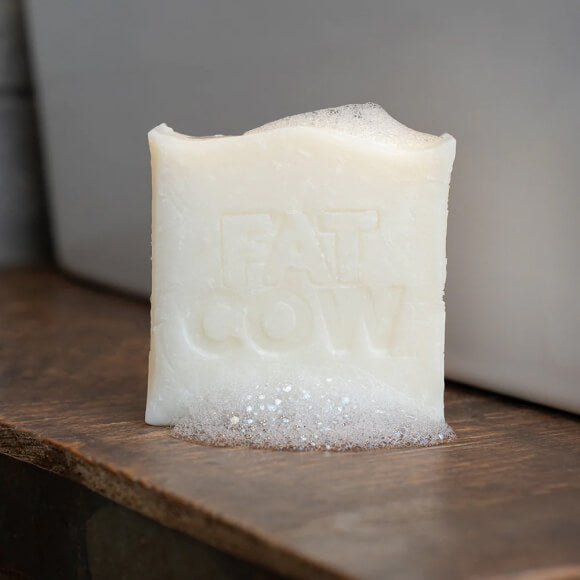Why Tallow Soap is Making a Comeback in Bathrooms Worldwide

For centuries, soap makers across the world and here in the UK have relied on tallow, rendered beef fat, to create cleansing bars. While vegetable oils have become more popular in recent times, tallow is experiencing a resurgence due to its unique properties and potential benefits for skin health.
Let’s take a peek into the world of tallow soap and figure out if it's your shower's new best friend. Is tallow soap just an old-school throwback, or could it be the missing piece in your washing routine? We'll break down the science behind tallow soap, its perks, and see how it stacks up against other choices.

A Timeless Tradition: Tallow in Soap Making
The use of tallow in soap-making stretches back millennia. Ancient civilisations like the Egyptians and Romans employed animal fats to create cleansing balms. The process of rendering tallow involves simmering beef fat to separate the liquid oil from the solid fats. This purified tallow then becomes a key ingredient in the soap-making process.
Tallow's popularity continued through the Middle Ages and into the early 20th century. However, the rise of mass production led to the increased use of vegetable oils, particularly palm oil, due to their lower cost and ease of processing.

The Science Behind Tallow Soap
So, what makes tallow such an effective soap base? The secret lies in its fatty acid profile. Tallow is rich in stearic acid and palmitic acid, both of which contribute to:
- Lather: These fatty acids create a rich, creamy lather that helps remove dirt and grime from the skin's surface.
- Hardness: Tallow bars are known for their long-lasting durability. The high content of stearic and palmitic acid helps the soap bar maintain its shape and resist melting in the shower.
- Conditioning: While tallow cleanses, it doesn't strip the skin of its natural oils. In fact, tallow contains oleic acid, a fatty acid similar to those found in human sebum. This allows tallow soap to cleanse gently while leaving the skin feeling soft and moisturised.

Benefits of Tallow Soap for Your Skin
Beyond its cleansing properties, tallow soap offers some potential benefits for skin health:
- Hypoallergenic: Due to its similarity to human sebum, tallow soap is generally less likely to cause irritation than soaps with harsh detergents or synthetic fragrances. This makes it a good option for those with sensitive skin.
- Moisturising: As mentioned earlier, tallow's fatty acid profile helps lock in moisture, preventing dryness and irritation.
- Anti-inflammatory: Some studies suggest that tallow possesses anti-inflammatory properties, which may be beneficial for conditions like eczema and psoriasis.
- Nutrient Rich: Beyond its cleansing power, tallow soap boasts a hidden treasure trove of vitamins. Unlike many commercially produced soaps that strip away natural nutrients, tallow soap retains valuable vitamins A, D, E, and K from the rendered beef fat. Vitamin A plays a key role in cell regeneration, promoting smoother and younger-looking skin. Vitamin D is crucial for maintaining healthy skin barrier function and protecting against environmental damage. Vitamin E acts as a natural antioxidant, fighting free radicals that contribute to wrinkles and premature ageing. Vitamin K, though lesser known, is involved in wound healing and may even help minimise the appearance of scars. This unique vitamin profile in tallow soap offers a natural approach to nourishing your skin from the inside out.

Sustainability Considerations: Tallow vs. Plant-Based Alternatives
The environmental impact of soap production is a growing concern. While Tallow utilises a by-product of the meat industry, some argue that animal-based products inherently have a larger environmental footprint.
On the other hand, the most common plant-based alternative, palm oil, raises sustainability concerns due to deforestation linked to its production. Additionally, some plant-based oils may require harsh processing methods to be suitable for soap making.
Ultimately, the most sustainable choice depends on several factors, including:
- Sourcing: Opting for tallow from ethically raised, grass-fed cattle can minimise the environmental impact. Likewise, choosing palm oil from certified sustainable sources helps ensure responsible production.
- Local Production: Supporting local soap makers, regardless of the fat source, reduces transportation emissions and promotes smaller-scale production practices.
Finding the Right Soap for You
Tallow soap's versatility makes it a great option for everyone in the household. Unlike some harsh facial cleansers, tallow soap's gentle cleansing properties are suitable for both the body and the face. Its lack of harsh detergents and synthetic fragrances minimises the risk of irritation, making it a good choice for those with sensitive skin. While some may have concerns about using it on oily skin, tallow's ability to mimic the skin's natural sebum can actually help regulate oil production over time. This, combined with its moisturising properties, makes tallow soap a potential benefit for all skin types, regardless of age.
Tallow soap offers a natural and potentially beneficial alternative to commercially produced soaps. By understanding its properties and considering sustainability factors, you can make an informed choice about the soap that best suits your needs.

FAQ #1: Can Tallow Soap Be Used For Shaving?
Tallow can absolutely be used for shaving! In fact, traditionally, tallow was a key ingredient in shaving soaps. Its rich fatty acid profile, particularly stearic acid, helps create a luxurious lather that softens hair and allows for a smooth razor glide. Additionally, tallow's moisturising properties can help prevent razor burn and irritation, leaving your skin feeling comfortable after the shave. While commercially available shaving creams might utilise other ingredients, some artisans still craft traditional shaving soaps using tallow for their superior performance and skin-friendly benefits.
FAQ #2: Is Tallow Soap Good For Eczema?
Many of our customers with eczema have shared positive experiences using tallow soap. They report that the soap's gentle cleansing and moisturising properties have helped soothe their eczema symptoms. The natural fats in tallow may mimic the skin's sebum, potentially reducing dryness and irritation, common eczema triggers. While individual results may vary, the anecdotal evidence suggests tallow soap could be a worthwhile addition to your eczema management routine. It's important to note that tallow soap isn't a cure, and consulting a dermatologist remains crucial for personalised treatment plans.
FAQ #3: Is Tallow Soap Hard To Make At Home
While tallow soap boasts a long history and relatively simple ingredients, making it at home can be a bit more challenging than following a store-bought recipe. The process involves rendering the tallow itself, which requires simmering beef fat to separate the liquid oil. This can be time-consuming and potentially messy. Additionally, working with lye, a highly caustic substance used in soap making, demands careful handling and proper safety precautions. For these reasons, many people opt for pre-made tallow soap from reputable vendors who can ensure quality control and safe production practices. However, if you're an experienced DIYer comfortable with safety measures and the rendering process, there are resources available online and in specialty stores to guide you through homemade tallow soap creation.
Myths and Facts About Tallow Soap
Tallow soap's resurgence has brought with it a wave of misinformation. Let's clear the air and separate fact from fiction:
Myth #1: Tallow soap clogs pores and causes breakouts.
Fact: While some fats can clog pores, tallow's fatty acid profile actually includes oleic acid, which mimics the skin's natural sebum. This allows tallow soap to cleanse without stripping away essential oils, potentially helping to regulate oil production and prevent breakouts for some skin types.
Myth #2: Tallow soap has a strong meat smell.
Fact: Properly rendered and saponified grass-fed tallow soap has a very mild scent, often described as slightly nutty or earthy. The strong meat smell is associated with unrefined tallow, not the kind used in soap making.
Myth #3: Tallow soap is not good for the environment.
Fact: This can be a complex issue. While tallow utilises a byproduct of the meat industry, some argue all animal-based products have a larger environmental footprint. However, opting for tallow from ethically raised, grass-fed cattle can minimise its impact. On the other hand, palm oil, a common plant-based alternative, raises sustainability concerns due to deforestation. Ultimately, the most eco-friendly choice depends on sourcing and production practices. Consider exploring eco-friendly options like The Clean and Cleanse Bundle, which features an assortment of environmentally conscious products.
Myth #4: Tallow soap is too harsh for sensitive skin.
Fact: Due to its similarity to human sebum and lack of harsh detergents, tallow soap can be a gentle and non-irritating option for sensitive skin. In fact, many customers with sensitive skin report positive experiences using the Tallow Soap Bundle by Fat Cow.
Myth #5: Tallow soap is a new invention.
Fact: Tallow soap has been around for centuries! Ancient civilisations used animal fats to create cleansing balms. While vegetable oils have become more popular in recent times, tallow soap's natural properties and potential benefits are leading to renewed interest.

Tallow Power Couple: Simplify Your Skincare with Soap & Cream for Radiant Results
Craving a simpler and more effective skincare routine? Look no further than the power duo of tallow soap and tallow body cream. This streamlined approach offers a wealth of benefits. Firstly, tallow soap gently cleanses without stripping away natural oils, leaving your skin feeling refreshed and balanced. Secondly, tallow body cream, rich in the same nourishing fatty acids, provides deep hydration without a greasy residue. This one-two punch simplifies your routine while ensuring your skin receives the essential cleansing and moisture it needs to thrive. The natural synergy between these fatcowskin tallow products minimises the need for a complex product lineup, allowing you to achieve excellent results with a streamlined approach. For more insights into how tallow could be the unsung hero in your skincare arsenal, go here.





